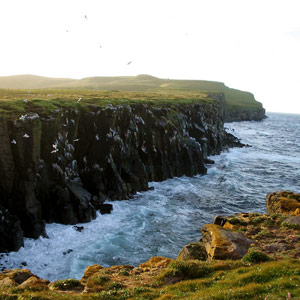Magazine | Voyages
Voyage ornithologique en Islande du 11 juin au 2 juillet 2003

Falaises sur l’île de Grimsey, située à proximité des côtes islandaises.
Photographie : MosheA / Wikimedia Commons
Introduction
Terre de feu et de glace, de volcans et de glaciers, l’Islande est devenue une destination très prisée, tant pour la beauté de ses paysages que pour la chaleur de l’accueil de ses habitants. A seulement trois heures d’avion de Paris, le dépaysement est garanti.
Ses décors, sans cesse en renouvellement font considérer l’Islande comme le pays au monde, après le Népal, qui offre le plus de variétés dans ses paysages, ses couleurs, ses ambiances… Plaines alluviales, cours d’eau tumultueux, falaises escarpées, zones volcaniques actives, avec failles, géothermie et la plus grande calotte glaciaire d’Europe, le Vatnajökull, 8 300 km² de glace opaque et bleutée.
Alors que le Grand Pingouin y a disparu au 19ème siècle, l’Islande offre aux voyageurs actuels la possibilité d’observer une belle variété d’oiseaux nordiques nicheurs : limicoles, canards et oies, oiseaux marins, migrateurs nord-américains, mais aussi rapaces prestigieux comme le Faucon gerfaut et le Pygargue à queue blanche.
André Boussard, accompagné de trois amis, y a effectué un séjour ornithologique du 11 juin au 2 juillet 2003. Il nous livre son rapport.
Abstract
Iceland is a place of great physical beauty, with a tumultuous history to match its sublime geography–the violent, elegant sagas of the Vikings seem of a piece with the abundance of active volcanoes, great glaciers, and shining fjords. The island brims with bird life. The fluting songs of Icelandic Whimbrels (Numenius phaeopus) (mix with the mournful notes of European Golden Plovers (Pluvialis apricaria) to provide unforgettable accompaniment to a landscape that was the last home of the Great Auk, a landscape that seems to have been built by giants.
Towering seabird cliffs, as at Látrabjarg, the westernmost point of the island, are breathtaking in scope and hold hundreds of thousands of alcids : Atlantic Puffin (Fratercula arctica), Common Guillemot (Uria aalge) and Thick-billed murres (Uria lomvia), Black Guillemot (Cepphus grylle), and Razorbill (Alca torda) hold court on the cliffs next to fulmars (Fulmarus glacialis) and Kittiwakes (Rissa tridactyla), with Great Skuas (Stercorarius skua) and Parasitic Jaegers (Stercorarius parasiticus) patrolling above.
Great numbers of waterfowl, of some sixteen species, nest on and around the Myvatn, a lake unrivaled in Europe.
Seventy Northern nesting species can be watched in Summer, some mostly Palearctic in distribution, such as White-tailed Eagle (Haliaeetus albicilla), Redwing (Turdus iliacus), Common Redshank (Tringa totanus), European Golden Plover, Pink-footed Goose (Anser brachyrhynchus), while others reach the eastern limit of their Nearctic range here: Common Loon (Gavia arctica), Barrow’s Goldeneye (Bucephala islandica), and Harlequin Duck (Histrionicus histrionicus). To see these birds with newly hatched young is a peerless experience.
The national bird is the Gyrfalcon (Falco rusticolus), known locally as falki or valur, and pale birds are relatively widespread in the North.
Iceland’s endemics, several of which are being considered for status as separate species, include taxa of Black-tailed Godwit (Limosa limosa islandica), Common Redpoll (Carduelis flammae islandica), Merlin (Falco columbarius islandica), and Winter Wren (Troglodytes troglodytes islandica).
For those interested, birers can also visit famed waterfalls, churches, museums. Iceland is virtually pollution-free and has a friendly population, outstanding cuisine, and modern infrastructure.
André Boussard, with three others birders, have visited the island between the 11th of June and the 2nd of July 2003, and he sent to us a report of his trip.
Poursuivez la lecture de cet article, en vous abonnant dès maintenant !
Découvrez les Archives d’Ornithomedia.com
Pour seulement 10,00 €TTC/an (ou 6,00 € les 6 mois)
Profitez de plusieurs centaines d’articles en accès illimité et sans aucun engagement.
Compléments
Auteur
André Boussard
À lire aussi sur Ornithomedia.com
- Séjour ornithologique en Islande, du lac Myvatn à la réserve naturelle de Floï
- Islande : feu, eau et oiseaux, du 9 au 22 juillet 2005
À lire sur le web
Le site web « Birding Iceland – Íslenskir Fuglar – Birds of Iceland » : https://notendur.hi.is//~yannk/index-eng.html
Ouvrages recommandés
- Carte routière : Islande – Iceland Cartes Freytag – 1 / 400 000ème
- Le guide Ornitho de L. Svensson




Aucun commentaire sur ce sujet
Participer à la discussion !